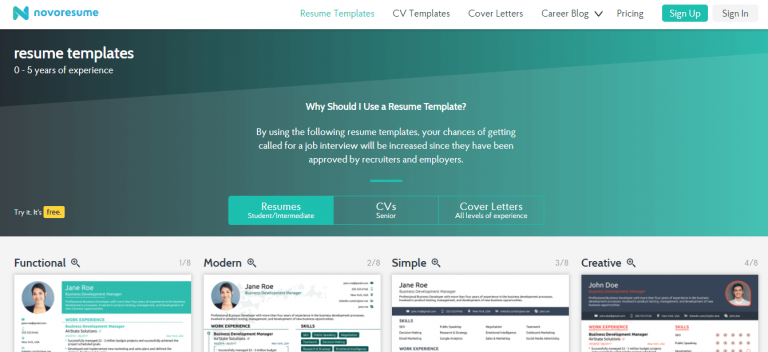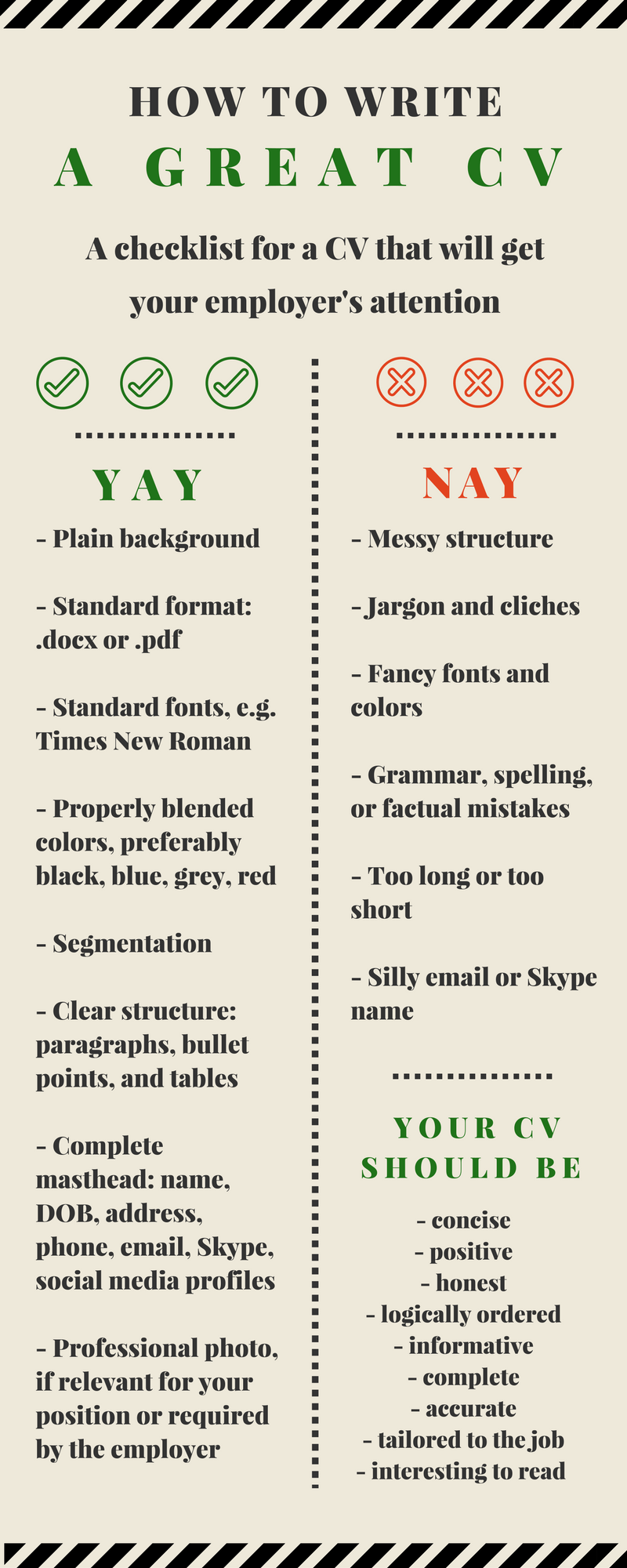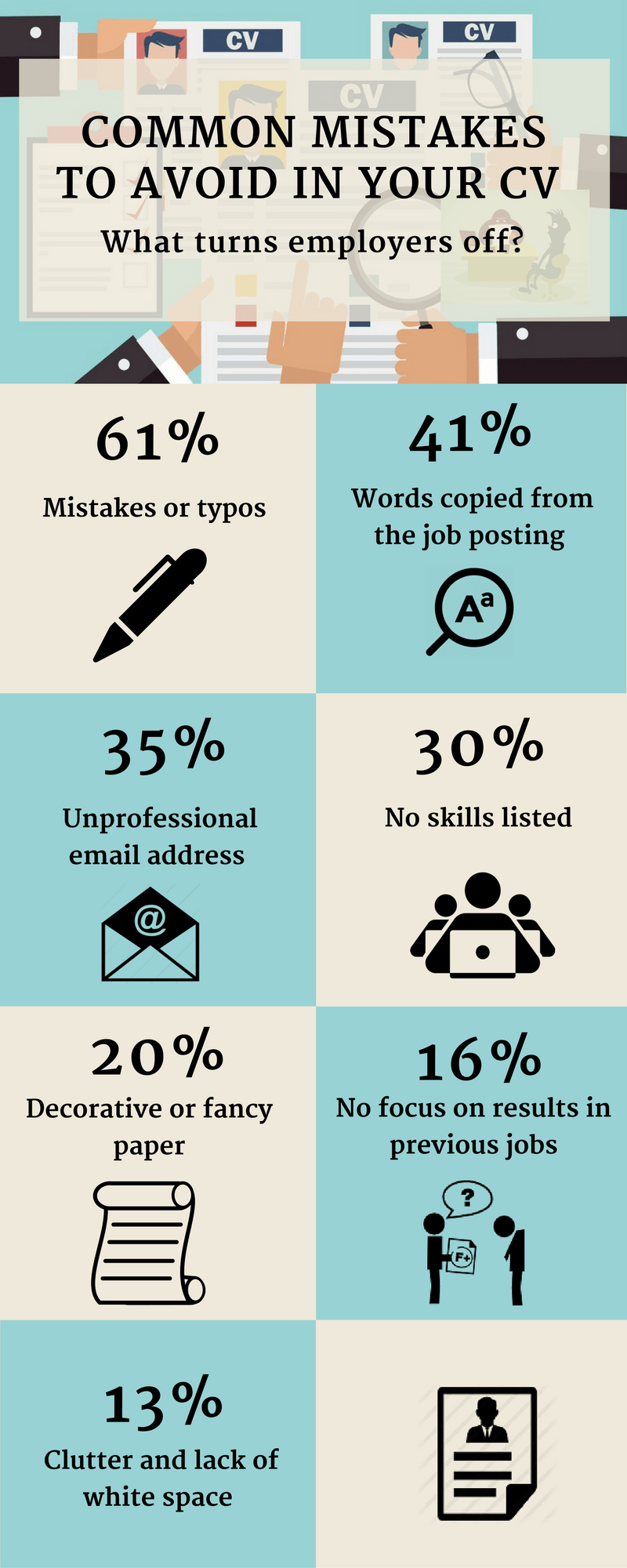According to the ever-helpful Wikipedia, a CV (or curriculum vitae) “is a written overview of a person’s experience and other qualifications.” But, in fact, this valuable document provides your potential employer with a much wider overview of your personality, background, achievements, skills, abilities, qualifications, and professional experience–basically everything you have accomplished within your lifetime.
Many people think they know how to write a CV to apply for a job, but they still manage to confuse a CV and a resume.
⚖️ What are their main differences then?
Both the CV and the resume offer a first impression of you, which is half the battle, as we all know. These documents are really the first step in your personal advertisement campaign aimed at grabbing the recruiter’s attention and making him want to meet you and get to know you better.
In short, a resume briefly lists your specific skills and things you’ve chieved, while a CV describes your career history in full.
That’s why we do not recommend that you use someone else’s CV as a template and just change something here and there. Because your CV is completely unique to you, it’s best to make your own CV an original expression of you.
So how do you do just that?
Follow our easy tips! With your professional and impressive CV in hand, you’ll be that much closer to an invitation to interview for a potentially life-changing job. Here’s something else that can help you at that stage as well: “12 Career Experts on Questions to Ask in a Job Interview.”
🚀 How can you skyrocket to the position of your dreams?
Our article will be extremely useful for those who want to know how to write a captivating CV for any position. There’s a list of rules that have to be strictly followed!
Okay, maybe not that strictly.
But still, try to stick to the main points to make sure your CV contains everything it should. And we’ll point out some aspects that are especially crucial.
So, if you are:
- A college graduate looking for your first job
- A job seeker looking to make a big change in your professional life
- An MBA program participant or happy graduate
- A job hunter in stealth
- Feeling ready for career growth
- _________________ (Your variant here)
These CV-writing hacks are for your!
Use these tips to progress along the thorny path to your personal stars!
1. Don’t chase excellence
What if you could write the perfect CV and get the job of your dreams?
We hate to disappoint you, but there are no perfect CVs on this planet. Each one of them is absolutely individual.
However, some CVs are especially creative. You may even be competing with this genius applicant who wrapped a chocolate bar with her resume.
But still, try not to go too far with your creativity; otherwise your CV—and you—may seem like a joke: “I want my CV to be the one you’ll remember. It’s also available as a music video, interpretive dance, webinar, 4-color glossy brochure, and a classic hardcopy.”
Even if your CV looks more conventional, it will be one of a kind because it reflects your unique personality, experience, and skills.
2. Stick to the basic structure
How to do it
No matter what specific document you’re preparing, you have to follow the general principles of its execution. You can make your CV as outstanding and super-creative as you want—as long as you cover all the main sections that the employer expects.
These sections are:
- Full name and contact details
- Educational background and qualifications
- Professional experience
- Skills and abilities
- Achievements and hobbies
How not to do it
If the recipient of your CV walks away with a mass of questions left to ask you, he might do one of two things: put your paper aside to come back to it later (if there are enough candidates, he may not return to it at all) or ask you to come for an interview to fill in the gaps.
But as a general rule, your CV should be complete and professional, giving all necessary information about you. Any ambiguity or lack of necessary information or explanation may induce additional questions and therefore doubt in the mind of the recruiter. Don’t give him or her the chance to doubt your quality as a candidate. Try to do your best to conform.
3. Don’t neglect your contact details
How to do it
Stay professional, even in the details. Your email address, Skype username, or social media nicknames can also give the recruiter some more understanding of your personality. Only include information about accounts that are 100% professional—don’t embarrass yourself by sharing pictures of your last big party.
When you haven’t seen a person yet and don’t know anything about him or her, every little piece of information is valuable and speaks about its owner.
How not to do it
One survey found that 76% of CVs with unprofessional email addresses are ignored, so think twice before including your funny or weird username in your professional document. If you’re crazy_fish,call.me.as.you.like, AAAThatsFourAs, or ihatemyjob, don’t rush to share this information with your potential hirer. Even if they happen to share your humor, it’s just not professional.
Want us to reveal more advice about how to write a CV? Keep reading!
4. Keep it short
How to do it and how not to do it
Although Shakespeare probably never saw a CV in his life, his words are absolutely applicable to our topic: “Brevity is the soul of wit.”
If you include a bunch of unnecessary facts from your exciting childhood, the recruiter will most likely fall asleep trying to read your CV-biography-essay. Spare the details while bearing in mind that the document must be complete.
So here are some general rules of thumb:
- Don’t make your CV too short or too long.
- Stay clear and precise.
- Be formal.
- Give essential facts.
- Any additional details can be mentioned during the interview.
5. Become your CV-tailor
How to do it
If you are really interested in getting a certain job, spend time adapting your CV for that specific role. Check the requirements and responsibilities of the position carefully, and tailor your CV accordingly. The updated version may require you to omit some irrelevant details or add in some extra information.
How not to do it
Tailor your CV to every new position, but don’t ever lie. A competent HR manager can easily spot insincerity, and it may result in unpleasant or humiliating consequences. No one wants to hire an employee who is not frank or likes to boast.
6. Showcase your achievements
How to do it
The main objective of your CV is to showcase who you are and what you have learned and achieved in your life. Your ultimate goal is to communicate how valuable you could be for the company. Your personal accomplishments are more important than just a dry description of your career steps.
For better visual appeal and easy understanding, you can list your achievements at every job in separate blocks. Your efforts and experiences—not a company name—are the most eloquent arguments for hiring you. Everything your effective CV contains has to show that you’re the best candidate and can make an important contribution to the company. Check out some essay samples on work application to see what we mean exactly. Or you can even search for full CV examples.
How not to do it
There are too many CVs out there that look like a list of life facts. These CVs are quite boring and don’t show your personality. On the other hand, though, you don’t want to give too many details that may seem either boastful or irrelevant.
Always remember that the average time that a CV gets from an HR manager is 5 to 7 seconds! That’s an extremely short period of time to grab your reader by his eyeballs.
Therefore:
Make the presentation of your CV visually interesting and full of content that the HR manager will want to dig through and discuss.
7. Mention your hobbies
How to do it
Here’s another section of your CV where you can distinguish yourself from the majority of candidates. You probably have or used to have some favorite pastime that reveals a little more about your personality.
Our interests and hobbies open our souls and make us feel devoted and happy. Don’t be afraid to open a little part of your inner world to the recruiter.
Who knows?
This part of your CV might just become the landmark working for your benefit by demonstrating your entire depth as a person, your intelligence, or some other interesting idiosyncrasy.
How not to do it
Avoid listing any passive and commonplace interests like watching TV or listening to the radio. Because the modern world opens up so many opportunities for us, “watching TV” might sound like the hobby of a lazy or careless person who prefers not to exert himself through self-development. Even if this is your hobby, it may be regarded as a rather suspicious sign.
If you put an ordinary activity like “reading books,” give more details as to what kind of books. Remember that your goal is to give the recruiter a better idea of who you are.
8. Attach available references
How to do it
What we say about ourselves is one thing—but what other people say about you is something else entirely, something that is often much more valuable to recruiters.
Try to attach the references you have, even if they are not perfect but show your real personality. We all have weak points and exposing them can be a sign of our courage and strength.
How not to do it
If you have a purely negative reference due to a broken relationship for some reason, it’s up to you to decide if you’re ready to reveal it. But you should be aware that a negative reference might lead to rejection by the potential employer.
Never provide false references either, as they can be easily checked by a simple phone call. You may face a reprimand or a total rejection.
Not the best outcome, right?
9. Keep your CV up-to-date
How to do it
An essential rule for writing a high-performance CV is timely revision and update. Time flies, and we are constantly facing changes in our personal and professional lives. Certificates, diplomas, new jobs, career growth, important accomplishments, new hobbies and interests, new skills… Even contact information can change!
Regularly updating your CV makes it richer and more valuable. Even if you are not looking for a position right now, try not to forget to refresh your CV, or else you might forget to add an important skill or accomplishment over time.
How not to do it
It’s not a good practice to neglect your course of life and to update your CV at the last minute after you’ve stumbled upon an interesting vacancy and have to send your application urgently.
That’s usually the moment when you frantically try to remember all your recently acquired knowledge, experience, and social involvements—and you inevitably miss something important.
10. Emphasize relevant work experience
How to do it
First of all, study carefully all the details you can find about the open position you’re struggling for. And then make the most of your past experiences.
If your previous work experience is different from your academic interests, consider mentioning the skills you acquired at those jobs. Are these skills worth putting on your CV? Or maybe in this case it would be better to briefly list them without any specific description? You might be asked for more details at the interview.
Secondly, think over the vocabulary you’re using for the work history section. There should be many positive and assertive words there. Use words like “accomplished,” “developed,” “was responsible,” “achieved,” “managed,” etc.
Thirdly, it’s worth adding a column specifying the reasons you left a particular position of employment. This information is quite meaningful for the person hiring you. But always stay frank and be ready to answer questions about it.
How not to do it
Do your best to avoid big gaps in work experience that might raise doubts or questions in the mind of the employer.
Also think about how long you’ve worked at past positions. Most companies prefer not to hire someone who just jumps from one job to another on a regular basis. Review your employment history and be ready to answer corresponding questions as well.
11. Make your CV elegant and classy
Let’s assume you have prepared an overwhelmingly awesome CV with lots of remarkable facts and details that will knock your future employer off his feet and will make him beg you to join their team.
Though the content is most important, remember that “fine dress helps to impress.” Good design—one that is crisp, sharp, and easy to read—can make your outstanding, rich content even better. Let’s go through some key principles.
Here’s where to find free templates to use for your resume:
A free tool with many styles to choose from. Choose a standard curriculum vitae format or an outstanding portfolio template. Change fonts and backgrounds, adjust your photos, make as many drafts as you need, and have a lot of fun.
The preparation of curriculum vitae on Resume.com saves you a lot of time. First, choose one template. Then, enter the details of your biography and experience by answering easy questions.

Need a perfect specimen of curriculum vitae? Try Novoresume templates. This website divides all styles according to their types. Write a CV for a university application, internship, or work. Make it in a creative, professional, modern, or functional format.
A list of 15 original templates for your fantastic CV. The choices vary a lot. So you can choose a unique template for the perfect resume.
Whether you are creating an academic portfolio or a resume for work, you will like this website. When you choose one of many stylish templates, you can adjust the characteristics as you want. Change the size of fonts and spaces, add page numbers, edit color sets, and so on.
Answer a couple of questions to generate your CV. You can create a resume as a student, entry-level employee, or a professional. Choose the color and font you like, and enter the necessary information.
Choose from dozens of templates made for such specialties as teacher, sales manager, chef, admin, and many more. This website also includes various CV choices for students.
The StudentJob CV Builder allows you to create a professional CV, quickly. How? Upload your existing CV or fill in the empty fields. Choose a layout, and voila, your CV is ready and waiting. Check out the rest of their application tips while you are there to find out how to write the perfect cover letter and smash interviews.
Here’s a brief checklist for a standard formal CV writing.

Why do they say “No”?
Good question. A bunch of interesting reasons why recruiters reject applicants based on their CVs were discovered as a result of an online study conducted by Harris Interactive© in 2012. The easiest answer to this question so often asked by applicants: because your CV has obvious mistakes! Always check your CV for mistakes and send it only when you’re completely sure it’s ready.
So, here are some of the most common mistakes based on the above mentioned research.

What’s the bottom line?
Anyone who wants to enhance their career prospects must have a professional CV. Not an ordinary CV, but one that will stand out from the crowd of hundreds of other candidates.
Making a professional CV is hard work requiring a serious and responsible approach at all stages: brainstorming, personal data entry, and final formatting.
Once you’ve checked your CV a thousand times and are sure it’s ready to be sent, please bear in mind the following:
Your door will open as soon as you’re ready. If you’ve been doing your best to land job interviews but haven’t gotten results yet, don’t give up! Keep on boosting your personal efficiency and knocking on different doors.
Good luck!
📚 Check out these resources
Wondering how to write a CV? These links will help you.
- Check out more hacks on how to write an impressive CV in this video:
![How to Write a CV: 11 Useful Tips [Infographic]](https://ivypanda.com/blog/wp-content/uploads/2020/11/company-human-resource-hr-is-holding-resume-application-tablet-hand-736x491.jpg)



I would recommend to customise the skills section of your resume, and ensure that it matches the job posting. The higher the number of phrases within the resume matching the job requirements the more are the chances that the recruiter will pick you for the job.
Thank you for sharing your thoughts, Nina!
You are an amazing writer.
Thank you, Jaqual 🙂